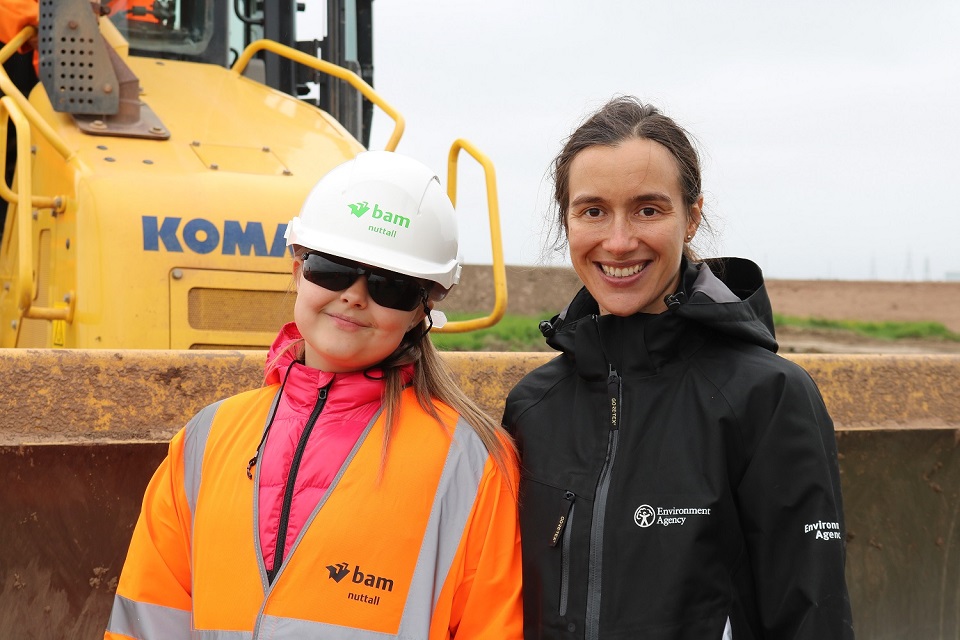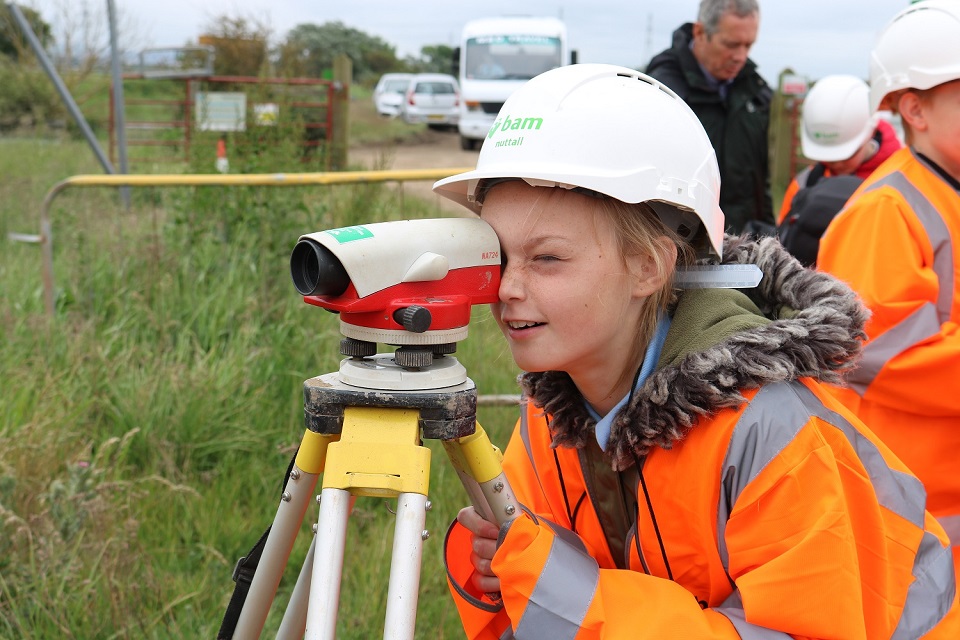Thank you, Stephen, for the introduction. Your work as a board member at BEIS has been of huge value, as has your contribution to this industry and many other spheres of public life.
It is fantastic to be here at the world’s largest AI Summit for businesses, which now in its third year is going from strength to strength. Quite apart from the range and reputation of our sponsors, the 10,000 visitors expected over the two days is testament to just how engaged and passionate the AI community is.
Almost 70 years ago to this day, in July 1948, just 15 miles upriver from here, a document (I have a facsimile here to show you) landed on the desk of the National Physical Laboratory – then, as today, the UK government’s leading research lab – that would be my nomination for the greatest research report ever written. The title: “Intelligent Machinery”. The author: Alan Turing.
It is breath-taking in its vision, confidence, intellectual fizz and prescience. I recommend all of you interested in AI to read it.
Alan Turing had discovered brilliant theoretical results in logic at Cambridge. Then, during the war, in pursuit of an overwhelmingly important national mission, he had become the most brilliant and innovative code-breaker, not only building machines, but also a team that continues to be legendary. At Bletchley Park, high theory merged with wires, transistors and solder to crack urgent real-world problems.
Then after the war the National Physical Laboratory recognised the extraordinary winning combination of practical, theoretical and human intelligence in the person of Turing and set him on his future path of building machine intelligence.
And here we are today, in direct descent, with a renewed understanding that the momentous potential of the AI and data revolution will bear full fruit when all of us – brilliant scientists, businesses as setters and solvers of real-world problems, investors as risk-takers, and government, as enabler, coordinator and partner, all come together.
That is why I have developed our country’s Industrial Strategy, and I am very pleased that many of the companies and institutions in the room today have come together to define an AI Sector Deal with government – it is just the start of a deep and rich relationship, and already it has committed over £1 billion in investment.
The changes that AI is bringing are epochal.
There aren’t many moments in human history when a technology turns up that changes everything. Agriculture … the wheel … the printing press … then steam, chemicals, oil, electricity; then the micro-processor. And we are living through one of those moments now. In 2017, when the London-based DeepMind beat Ke Jie, humanity’s best Go player, a symbolic date entered the history books.
So why is AI quite so revolutionary?
Because previous technological revolutions discovered specific ways to improve human lives; this revolution has discovered automatic ways of discovering more. Thus the power to improve the lot of humanity is unprecedented.
No wonder there are “Singularity-mystics” in California who believe this is taking us rapidly towards Starship Enterprise. Well … I’m certainly all for the “Enterprise” bit, even the starships of our space program, but I’m not sure about the singularity. An instance, perhaps, of the British pragmatism, empiricism and understatement that has proved its worth in science and business.
The extraordinary transformations this implies are not pie in the sky, they’re not “flying cars tomorrow”. They are happening, as attested by so many of the amazing ways that the businesses in this room are already using AI.
Whether it is Professor Rose Luckin making a robotic teaching assistant that takes the drudgery out of routine marking and administration …
or Rolls Royce – I look forward to hearing from Neil Crockett their Chief Digital Officer – building autonomous ships ….
Whether it’s Improbable – our latest UK -bred unicorn ($500m raised from Softbank. congratulations! ) – building the most sophisticated general purpose simulations of reality ever seen …
Memrise, a language learning app who I heard just yesterday had raised £11.5 million …
or indeed Quantaxa, harnessing the value of huge databases to combat financial fraud
Whether it’s RAVN automating the dullest aspects of document control in a complex corporate legal process – no offence taken, I hope, from any lawyers in the room for the suggestion that not every aspect of the job is scintillating …
or a composer automating the orchestration of their latest symphony …
Whether it’s Babylon – the UK-developed health triage robot revolutionising front line access to health in Rwanda …
or Darktrace, the AI-powered security company that is already used by 5000 global businesses to keep their networks secure …
I am genuinely in awe of the range, the creativity, the power, of what you in this room are doing and building.
And the more I find out about how this technology works – how reinforcement learning in complex networks rewards one parameter or downgrades another – the more I am struck by the parallels between the economy – that somewhat complex system whose long-term health my department has much of the responsibility for – and an AI system.
Indeed, at the same time as Turing was writing in Teddington, Hayek, the Nobel prize winning economist who made London his home for many years was in his office at the LSE, just 6 miles away from where we stand, working on his theory of the economy as a massively parallel social computer; individuals, companies and entrepreneurs were nodes that were endlessly locally optimising and feeding information to neighbouring nodes.
So in a sense, we are all involved in an enormously complex large-scale network optimisation. Our Industrial Strategy is a crucial piece of that optimisation. We need to upgrade our economy – version 4.0 – for the great transformation that is coming, and we approach this task in the spirit of intelligent designers.
We have set ourselves the grand challenge of putting the UK at the forefront of the AI and data revolutions. The Prime Minister has announced our “moonshot” mission of using AI-powered early diagnostics to revolutionise cancer treatment in this country, with 20,000 more 5-year survivors by 2030. I hope that many of you in this room will be involved in reaching our ambition to increase survival probabilities for common cancers.
But the opportunities of AI run deep throughout our Industrial Strategy.
Taking each of the 5 foundations in the Strategy:
Ideas
- We are spending an additional £7 billion in public R&D over five years – the greatest real-terms increase of any UK government ever
Skills
- We are investing in the deep skills that are needed, supporting our world-class universities throughout the country to build on their strengths – London and Edinburgh for pure AI and computing; Queen’s University Belfast in cryptography, Birmingham and Liverpool in medtech – to name just a handful. And thanks to our new funding, 1000 more researchers every year will be studying for an AI-related PhD
People
- I’m very pleased to be able to announce today that our AI Masters Programme, a central plank of the AI Sector Deal, has brought together the British Computer Society and the Turing Institute with leading universities, and businesses like Ocado, Amazon and Rolls Royce, and will start work in July
Infrastructure
- Anywhere access to top quality digital networks is vital to support the development of the AI and data driven economy that we are committed to. Currently superfast broadband is available to 91% of UK premises, and by 2025 15 million premises will have full-fibre
Business Environment
- I have asked the regulators of the sectors that many of you here are busy disrupting to build on the sandbox concept to find imaginative ways to be innovator-friendly
Places
- our densely connected network of global top 100 university cities and towns creates thriving places in which workers find the jobs of the future and firms find the skilled, creative and confident workforce to build it
- indeed, TechNation’s 2018 report published just last month, described a network of more than 3,500 tech meeting up groups throughout the UK, with over 1.6 million individual members. And to underline the fact that tech doesn’t just live in London – these groups meet up in 283 locations across the country
AI is at the centre of a thriving digital tech sector now worth £184 billion to the UK economy. Tech-related investments in Britain surged nearly 90% last year, more than in France, Germany and Sweden combined.
This investment and growth is a tribute to the intellectual creativity which is such a key part of what we offer to the world. When it comes to Nobel prizes in the Sciences, we come second only to the USA. But we have 50% more Nobel prizes per head of population than the USA. When it comes to universities in the global top 100, we come second only to the USA. But we have a whopping 2200% more of them per square mile than the USA.
Why does this matter so much? Because innovation, creativity, thriving lives and thriving places all go with dense networks and connections. In many ways, innovation is like a chemical reaction: the concentration of inputs matters. And indeed, the facts bear this out – with less than 1% of the world’s population, our universities account for 16% of the world’s most-cited academic articles. That excellence leans on geography and language and the warm welcome we have always and will always extend to talent from all over the world. But it also rests on the key organisational foundations for good research: openness, curiosity, independence, and strict academic meritocracy.
A change as momentous as this needs not just Sectors, Industries, Universities and Localities to work together – as if that were not already a huge task. Government needs to ensure that the whole country understands and supports the great changes ahead.
Remember for a moment the Luddites. They often come up as the group that was on the wrong side of history, dinosaurs. They were that, but they were also skilled artisans, ordinary people frightened for their future place in society. Today we know their fears were unjustified – that we have never had more demand for good, skilled jobs than when the machines have taken the grunt out of human work. And it will be the same again: AI and automation will raise the demand for the most human work; and the government, with business and educational bodies, will deliver the institutions that allow everyone to develop their skills.
It is not only as workers that some are fearful. Take our lives as consumers, for example: personalised pricing, technology designed to be addictive, our data being used against our interests.
Let me give an example that might appeal to those of you who have flown in for this event on an economy airline. If you travelled with a family member, bearing the same surname, did that airline’s booking system automatically place you together? Or did it automatically place you in non-adjoining seats, to try to extract from you a premium payment for the ‘privilege’ of travelling together? On such questions will the trust of customers be won or lost.
Once again, government’s role is to bring forth an environment in which companies treat customers with the respect they deserve, not use data and digital technology to exploit them. Our Consumer Green Paper, published in April, has started this conversation.
Shifting social understandings and practices – we have done this well before. Think of the way that we’ve been able to build popular support for stem-cell research. We are doing the same thing around the use of data and algorithms by establishing the Centre for Data Ethics and Innovation, with the goal of developing a new national consensus around data and AI. I am delighted that Roger Taylor was this morning announced as chair of the Centre. Roger founded Dr Foster and understands how innovative use of data can deliver huge benefits for service users.
Take just one example of what I mean. We have our mission to massively improve diagnostics with AI. Our side of the deal to achieve this is to provide funding, for sure. But even more valuable, it is to allow secure access to the resource that is our NHS data. For this, we need the public to trust that the power this unleashes will be well used to help us live longer, healthier lives.
Our democracy and institutions have the pragmatism, legitimacy and flexibility to rise to the challenge of bringing the whole country behind these momentous transformations.
And this, of course, is a sense in which our task in creating this better future is in fact different from the task of optimising an algorithm: the ultimate object and purpose is always enhancing human capabilities.
Let me come back to Alan Turing’s extraordinary research proposal. When describing social intelligence, a form he does not think he can automate, he writes: “the search for new techniques must be regarded as carried out by the human community as a whole”.
The power of the AI transformation for good is immense. We, here today, bring together all the skills and functions to succeed in this most important of tasks – to search these new landscapes for the good, to echo Turing’s words, of “the human community as a whole”.
Together, we will build the talent, invent the tools, solve the big problems of humanity, and align all this with the public good.
To work, colleagues!


